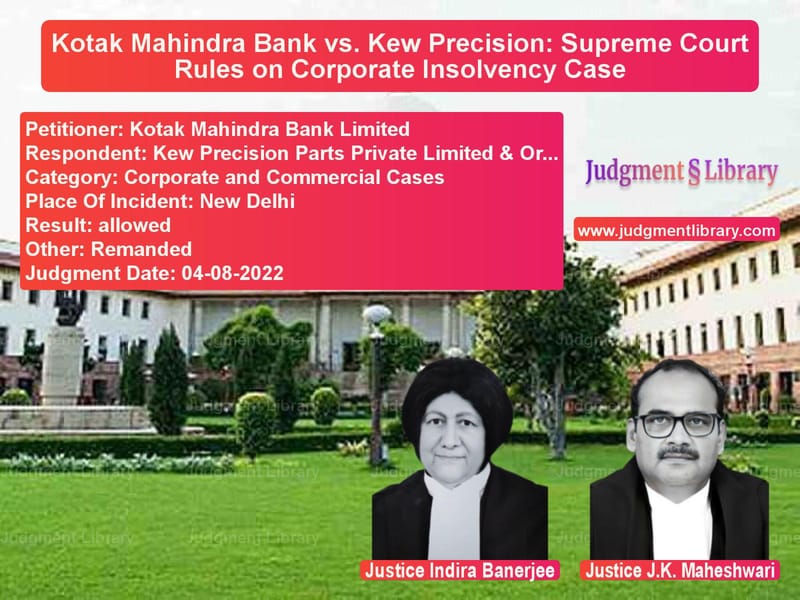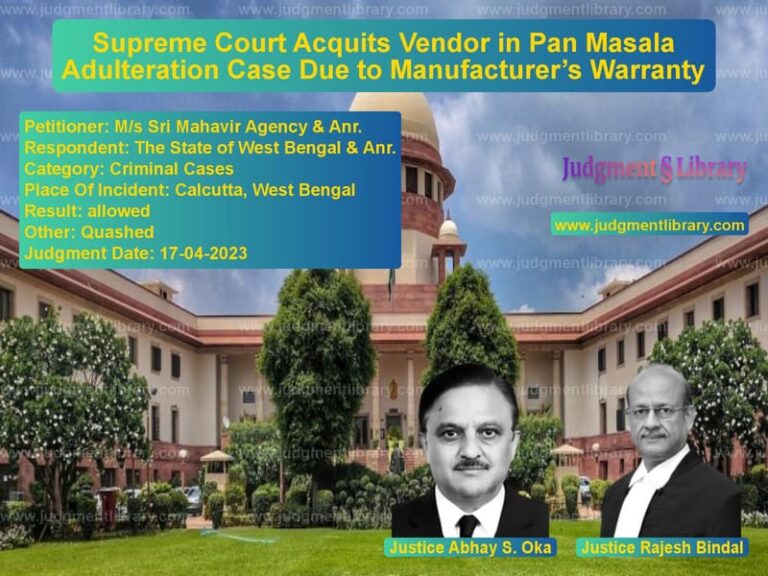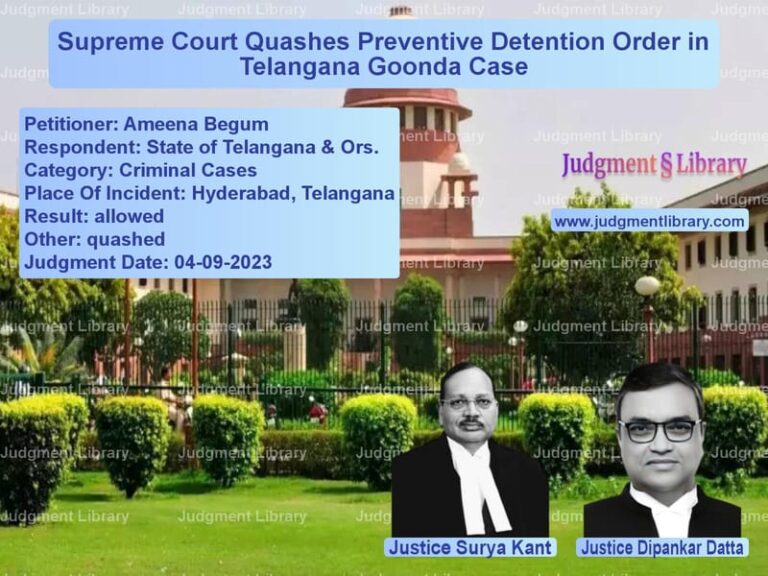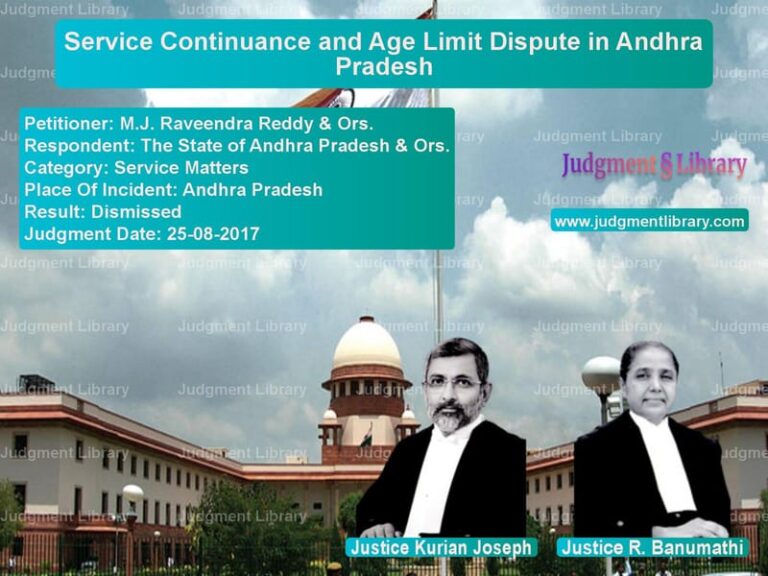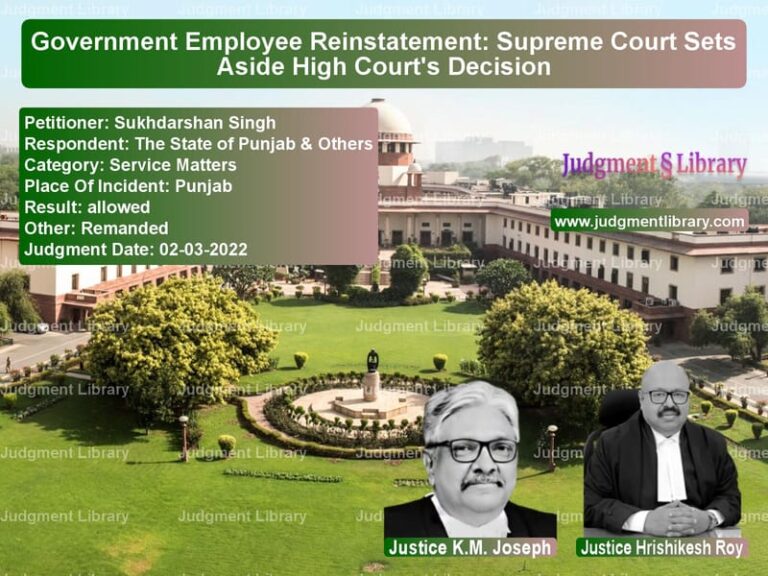Kotak Mahindra Bank vs. Kew Precision: Supreme Court Rules on Corporate Insolvency Case
The Supreme Court of India, in its judgment dated August 5, 2022, addressed a significant dispute in the case of Kotak Mahindra Bank Limited vs. Kew Precision Parts Private Limited & Ors.. The appeal, filed under Section 62 of the Insolvency and Bankruptcy Code, 2016 (IBC), challenged the decision of the National Company Law Appellate Tribunal (NCLAT), which had reversed an earlier ruling by the National Company Law Tribunal (NCLT) admitting a Corporate Insolvency Resolution Process (CIRP) against the respondent.
The case is crucial in interpreting the applicability of the IBC, particularly regarding limitation periods, acknowledgement of debt, and the role of Section 25(3) of the Indian Contract Act. The Supreme Court ruled in favor of Kotak Mahindra Bank and remanded the matter back to NCLT for fresh consideration.
Background of the Case
Kew Precision Parts Private Limited, the corporate debtor, was engaged in manufacturing tractor and tempo components. In 2012-2013, the company sought financial assistance and subsequently availed various credit facilities from Kotak Mahindra Bank Limited.
Between 2012 and 2013, Kotak Mahindra Bank sanctioned multiple loans to Kew Precision Parts, backed by security agreements. However, the corporate debtor defaulted on repayment, leading the bank to declare the account as a Non-Performing Asset (NPA) on September 30, 2015. Despite several attempts at settlement, the company failed to fulfill its obligations.
Legal Proceedings
Adjudication by NCLT
In January 2019, Kotak Mahindra Bank filed an application under Section 7 of the IBC, seeking to initiate CIRP against Kew Precision Parts. The NCLT admitted the application on September 6, 2019, finding that the corporate debtor had defaulted on payments exceeding the threshold of Rs. 1,00,000. The tribunal rejected arguments concerning limitation and noted that the corporate debtor had admitted its liability through a one-time settlement proposal on December 12, 2018.
Reversal by NCLAT
Kew Precision Parts challenged the NCLT order in NCLAT, arguing that Kotak Mahindra Bank’s application was barred by limitation. The NCLAT agreed, ruling that:
- The default had occurred in June 2015 when the company stopped making payments.
- The three-year limitation period under Article 137 of the Limitation Act, 1963, had expired by June 2018.
- The company’s one-time settlement proposal in December 2018 did not qualify as an acknowledgment of debt, as required under Section 18 of the Limitation Act.
- Time spent in recovery proceedings under the Securitisation and Reconstruction of Financial Assets and Enforcement of Security Interest (SARFAESI) Act, 2002, could not be excluded for computing limitation.
Arguments Before the Supreme Court
Petitioner’s (Kotak Mahindra Bank) Arguments
The bank contended that:
- The limitation period should be computed from December 12, 2018, when Kew Precision Parts acknowledged the debt and proposed a settlement.
- Under Section 25(3) of the Indian Contract Act, a written promise to pay a time-barred debt is enforceable.
- The NCLAT erred in ignoring the agreement reached between the parties for debt settlement.
- IBC proceedings are not barred simply because alternative recovery mechanisms, such as SARFAESI, have been initiated.
Respondent’s (Kew Precision Parts) Arguments
The corporate debtor argued that:
- The NPA declaration in September 2015 marked the beginning of the limitation period.
- The CIRP application, filed in January 2019, was beyond the three-year limitation period.
- Merely making a one-time settlement proposal does not constitute an acknowledgment under Section 18 of the Limitation Act.
- The proceedings initiated under SARFAESI in 2017 were irrelevant to computing limitation for CIRP.
Supreme Court’s Observations and Judgment
The Supreme Court analyzed the arguments and ruled in favor of Kotak Mahindra Bank, emphasizing key principles:
1. Applicability of Section 25(3) of the Indian Contract Act
The Court noted that Section 25(3) permits the enforcement of a written promise to pay a time-barred debt. It observed:
“Under Section 25(3), a debtor can enter into an agreement in writing, to pay the whole or part of a debt, which the creditor might have enforced, but for the limitation of a suit in law. A written promise to pay the barred debt is a valid contract.”
Since Kew Precision Parts had executed a settlement agreement on December 20, 2018, agreeing to repay Rs. 24.55 crores by December 31, 2018, the limitation period restarted.
2. Role of Acknowledgment of Debt
The Court distinguished between an acknowledgment under Section 18 of the Limitation Act and a promise under Section 25(3) of the Indian Contract Act. While an acknowledgment must be within the limitation period, a promise under Section 25(3) creates a new contractual obligation.
3. Distinction Between Recovery Proceedings and CIRP
The Court clarified that proceedings under SARFAESI and IBC serve different purposes:
“The IBC is not just another statute for recovery of debts. Nor is it a statute which merely prescribes the modalities of liquidation of a Corporate body, unable to pay its debts. It is essentially a statute which works towards the revival of a Corporate body, unable to pay its debts, by appointment of a Resolution Professional.”
4. Revival of CIRP Proceedings
Holding that the NCLAT erred in dismissing the CIRP proceedings outright, the Supreme Court ruled:
“The appeal is allowed. The impugned judgment of NCLAT is set aside. The matter is remanded to NCLT for fresh consideration, allowing both parties to file additional affidavits.”
Conclusion
The Supreme Court’s ruling in Kotak Mahindra Bank vs. Kew Precision Parts sets a crucial precedent in corporate insolvency law, particularly in interpreting the interplay between limitation laws and debt recovery mechanisms. The judgment reinforces that:
- Section 25(3) of the Indian Contract Act can revive a time-barred debt.
- IBC proceedings focus on corporate revival rather than mere debt recovery.
- NCLT must examine fresh evidence regarding settlement agreements before dismissing CIRP applications.
The case highlights the judiciary’s nuanced approach in balancing creditors’ rights with corporate insolvency resolutions, ensuring that defaulters cannot evade liability merely by invoking limitation defenses.
Petitioner Name: Kotak Mahindra Bank Limited.Respondent Name: Kew Precision Parts Private Limited & Ors..Judgment By: Justice Indira Banerjee, Justice J.K. Maheshwari.Place Of Incident: New Delhi.Judgment Date: 04-08-2022.
Don’t miss out on the full details! Download the complete judgment in PDF format below and gain valuable insights instantly!
Download Judgment: kotak-mahindra-bank-vs-kew-precision-parts-supreme-court-of-india-judgment-dated-04-08-2022.pdf
Directly Download Judgment: Directly download this Judgment
See all petitions in Bankruptcy and Insolvency
See all petitions in Corporate Compliance
See all petitions in unfair trade practices
See all petitions in Judgment by Indira Banerjee
See all petitions in Judgment by J.K. Maheshwari
See all petitions in allowed
See all petitions in Remanded
See all petitions in supreme court of India judgments August 2022
See all petitions in 2022 judgments
See all posts in Corporate and Commercial Cases Category
See all allowed petitions in Corporate and Commercial Cases Category
See all Dismissed petitions in Corporate and Commercial Cases Category
See all partially allowed petitions in Corporate and Commercial Cases Category

